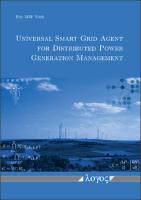Universal Smart Grid Agent for Distributed Power Generation Management
Author(s)
Veith, Eric MSP
Collection
Knowledge Unlatched (KU)Language
EnglishAbstract
"Somewhere, there is always wind blowing or the sun shining." This maxim could lead the global shift from fossil to renewable energy sources, suggesting that there is enough energy available to be turned into electricity. But the already impressive numbers that are available today, along with the European Union's 20-20-20 goal – to power 20% of the EU energy consumption from renewables until 2020 –, might mislead us over the problem that the go-to renewables readily available rely on a primary energy source mankind cannot control: the weather. At the same time, the notion of the smart grid introduces a vast array of new data coming from sensors in the power grid, at wind farms, power plants, transformers, and consumers. The new wealth of information might seem overwhelming, but can help to manage the different actors in the power grid. This book proposes to view the problem of power generation and distribution in the face of increased volatility as a problem of information distribution and processing. It enhances the power grid by turning its nodes into agents that forecast their local power balance from historical data, using artificial neural networks and the multi-part evolutionary training algorithm described in this book. They pro-actively communicate power demand and supply, adhering to a set of behavioral rules this book defines, and finally solve the 0-1 knapsack problem of choosing offers in such a way that not only solves the disequilibrium, but also minimizes line loss, by elegant modeling in the Boolean domain. The book shows that the Divide-et-Impera approach of a distributed grid control can lead to an efficient, reliable integration of volatile renewable energy sources into the power grid.
Keywords
Technology & Engineering; Construction; Computers; Computer ScienceDOI
https://doi.org/10.30819/4512ISBN
9783832545123Publisher
Logos Verlag BerlinPublisher website
https://www.logos-verlag.com/Publication date and place
2017Imprint
Logos Verlag BerlinClassification
Building construction and materials
Computer science


 Download
Download